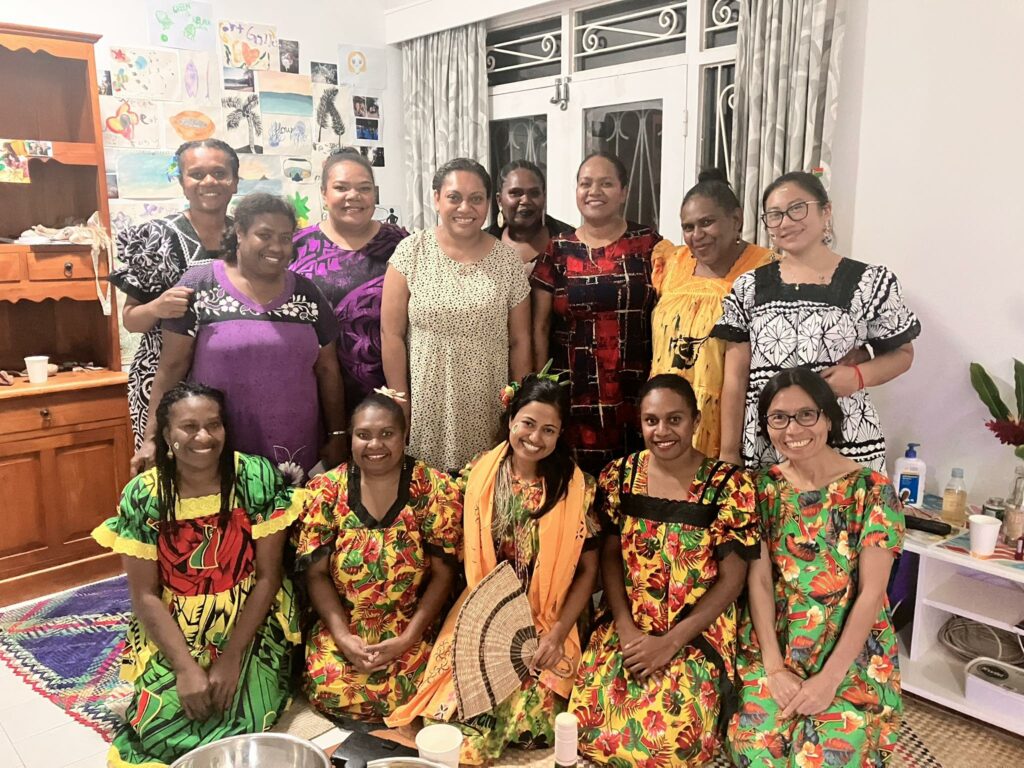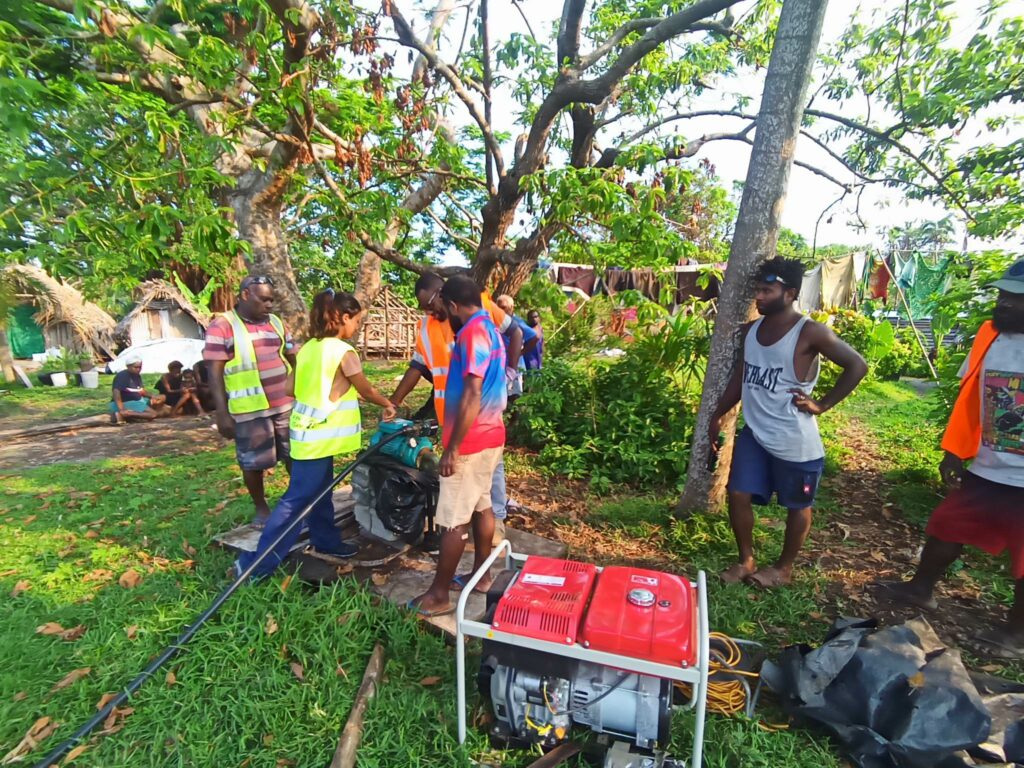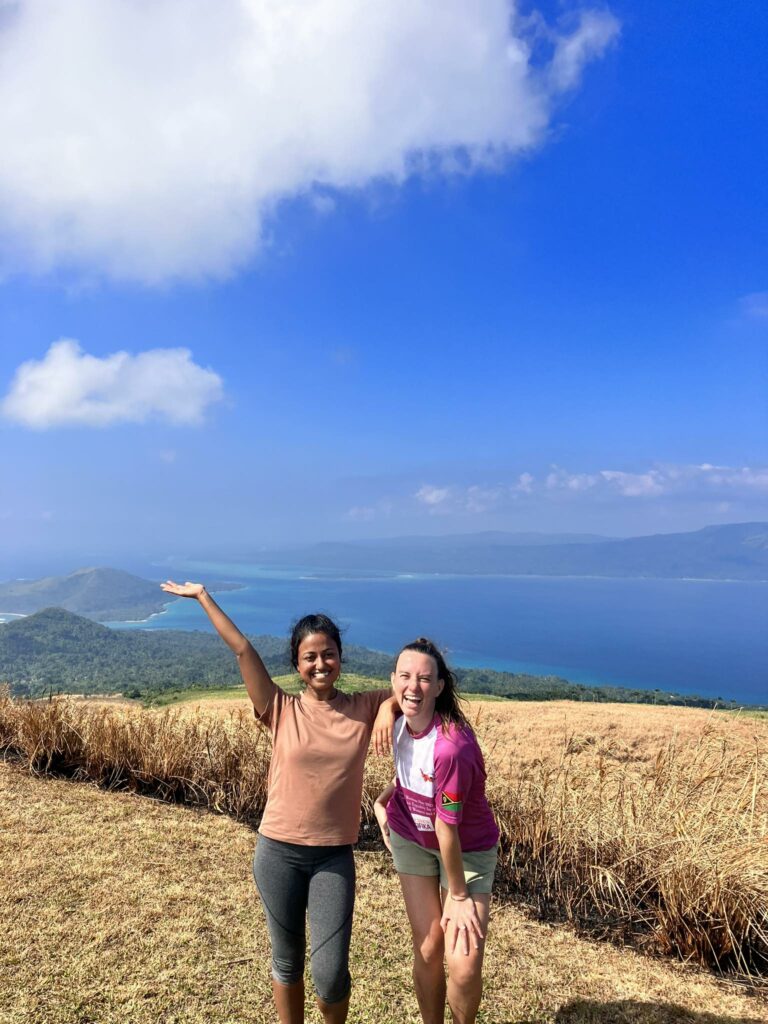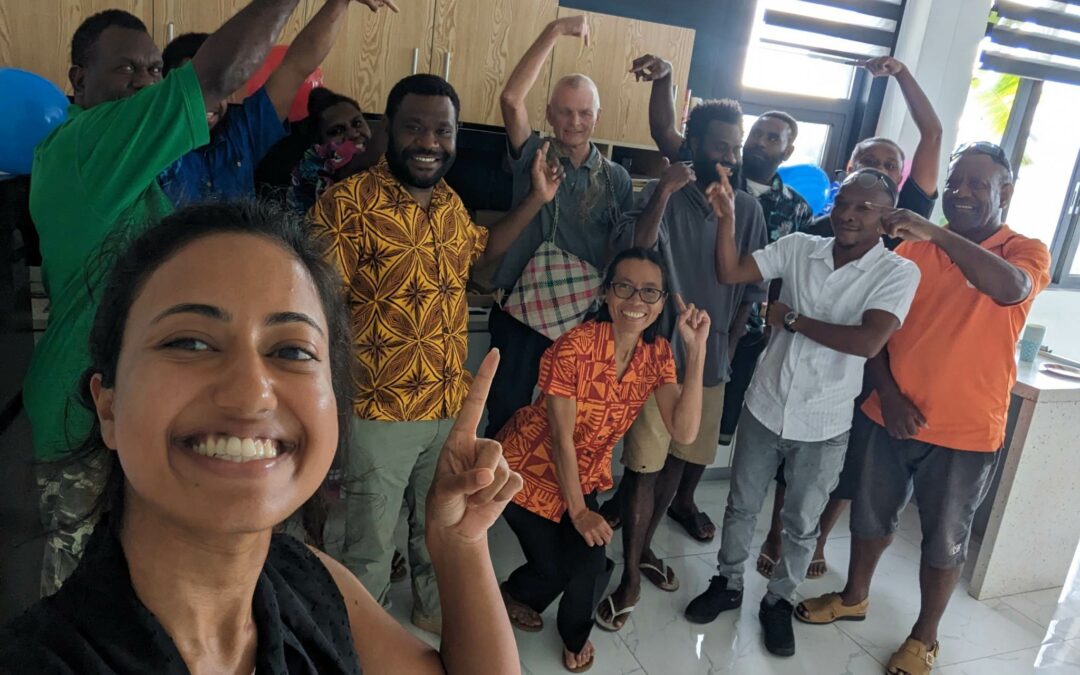Feature image: Sadia Abdullah and her team at the Vanuatu Department of Water Resources during her year abroad as an EWB Australian Volunteers Program Field Professional.
When Sadia Abdullah arrived in Vanuatu, the first thing she noticed was the heat and the humidity. The second was how friendly everyone was, and the strong sense of community.
Sadia flew into Port Vila, the capital of Vanuatu, in August 2022. Months earlier, she was at home in Sydney under tight COVID restrictions and eager to go anywhere outside her living room. Now, just a three-hour flight from Sydney, she was in beautiful Vanuatu, a country she knew almost nothing about a few months prior — just “that it was a dot in the Pacific”. Vanuatu is an archipelago of 83 islands with a population of around 300,000 people, located east of Australia on a similar latitude to Cairns.
Sadia had always known that she wanted a job that allowed her to travel. With her interest in science and maths at school, civil engineering felt like an obvious choice at university. She figured “all of society needs help building”. She had several years’ experience under her belt as a civil engineer in Sydney when a colleague sent her an advert for a volunteer role created in partnership with the Australian Volunteers Program and Engineers Without Borders Australia (EWB) for a technical services engineer role with the Department of Water Resources (DoWR) in Vanuatu. Though she had initial apprehensions, she seized the opportunity to fulfil her original reason for pursuing engineering. Sadia was accepted to volunteer for 12 months abroad with EWB through the Australian government funded Australian Volunteers Program.

Sadia and her colleagues at the Department of Water Resources (DoWR) in Vanuatu, who gifted her a dress and basket at her farewell.
Volunteering as a technical services engineer with the DoWR wasn’t just about planning, designing and building water supply systems in rural areas; it was problem-solving in the extreme. The first few months working in Vanuatu were challenging for Sadia as she adjusted to the local culture, ways of work and different availability of materials and resources on the remote archipelago. These challenges meant Sadia had to employ a different type of engineering to what she was familiar with in Sydney. She returned to first principles engineering: understanding local community needs through consultation and problem-solving to deliver the best solutions with the resources available.
Sadia understood that as a foreigner joining the team, there would be an adjustment period culturally for herself and the Vanuatu team, “where we were trying to understand each other and how we work”. While the work of an engineer can be stressful with tight deadlines and complex problem-solving, Sadia stayed true to herself and her values of “being friendly, always treating others with respect and being open and honest about how you do things”.
After a few months of taking lessons in Bislama, the main local language, Sadia began to put her skills to use. “I might as well try to speak Bislama and make a fool of myself rather than make them all uncomfortable speaking English”, she said. The impact was immediate: “The moment I just pushed through with speaking Bislama, everyone became much more comfortable, and I think it’s just so much nicer to converse in your home language, right?” She bonded with the team in Vanuatu and maintained a strong working relationship – they still keep in touch to this day.

Sadia and the team troubleshooting a pump to provide an alternative access to water for a community.
In a country prone to natural disasters, Sadia and the DoWR team had serious challenges to overcome together. Following twin tropical cyclones Judy and Kevin in March 2023, mass destruction devastated the water supplies of rural communities in the archipelago. It was in this six-week emergency response period that Sadia faced a steep learning curve, working directly with affected communities on Tanna island assessing water needs and water systems, fixing leaks, and collecting data for long-term design and construction. Though initially confronting, Sadia found these periods of work to be some of the most rewarding of her time in Vanuatu, as she witnessed the resilience and spirit of the community as they came together after the cyclones to clean up the debris.
The local community also mobilised to help themselves and each other by digging out the pipe work that had been covered from landslides, and rebuilding and maintaining the water supply system. When the water supply was finally restored, the community was so grateful and happy, they threw a big party to celebrate. For Sadia, seeing the impact of her work was rewarding, especially to witness how empowered the community were following almost a month without water. The silver lining from this emergency response is that the team is now better equipped to respond to future cyclones, based on the work and documentation Sadia and the team prepared in 2023.
Throughout the year, Sadia enjoyed her time off work, indulging in some of the pleasures of Vanuatu’s island life – snorkelling, hiking, and exploring parts unknown to tourists, with the guidance of her new local friends.

Sadia and her housemate and fellow Australian volunteer hiking to the peak of Nguna Island, an outer island off the north coast of Efate, Vanuatu.
Living in Vanuatu and helping engineer rural water systems gave Sadia time to reflect on her father’s upbringing in rural Bangladesh, where his village relied on a ground pump for water. “It would actually be fantastic to use all of these new skills that I’ve learned, this information, this new skillset to apply it to Bangladesh… I think it did inspire me to get back in touch with my roots and see what I can do for my village and family in Bangladesh”.
Off the back of this year-long adventure in Vanuatu, Sadia feels positive about the future. Having learnt so much about herself and her capabilities both professionally and personally, she is excited to take on whatever future opportunities come her way. Sadia is looking forward to the day she can impart her wisdom to the volunteers who follow in her footsteps and provide them with the same care and support she received from the EWB network. Her advice to anyone thinking about volunteering overseas with EWB – “just do it! If it’s something you’re leaning towards, you should just grab the opportunity.”
If you’re interested in volunteering overseas as an Australian Volunteers Program Field Professional with EWB, check out our current opportunities at ewb.org.au/volunteer. The Australian Volunteers Program is an Australian Government-funded initiative.


